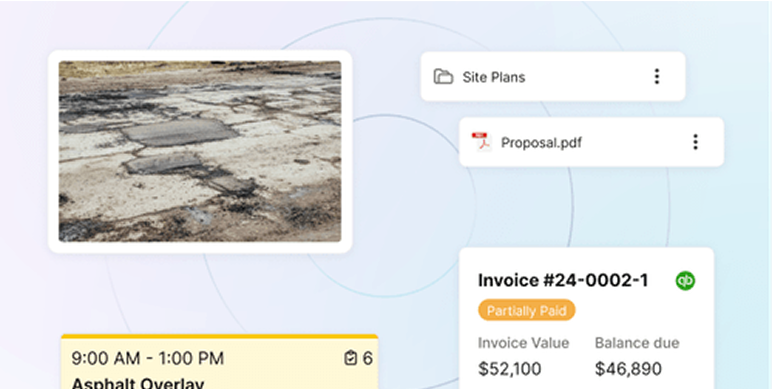B2W vs. HCSS: Which Estimating Software Wins in 2026?
B2W Estimate wins for heavy civil contractors who need intuitive interfaces and seamless integration, whereas HCSS HeavyBid excels at complex highway and DOT projects.
Both platforms pack serious estimating power but target massive infrastructure contractors with enterprise-level complexity. HCSS demands 1 to 3 months of training to become proficient, whereas B2W users become productive within days through its unified estimating-to-operations approach.
I've tested both extensively across real construction projects, and here's what contractors miss: neither platform addresses paving-specific workflows. You're paying enterprise prices for highway-focused features when you need purpose-built tools for commercial parking lots, residential driveways, and municipal road projects instead.
B2W vs. HCSS: What's the Difference?
B2W Software provides unified construction platforms for heavy civil contractors, offering estimating through operations in one integrated system.
HCSS specializes in heavy construction with robust estimating, field tracking, and equipment management tools built specifically for infrastructure projects.
- Choose B2W if you want faster implementation, intuitive interfaces, and unified estimating-to-operations workflows without extensive training.
- Choose HCSS if you handle complex DOT projects, need advanced crew-based estimating, and have dedicated staff to manage the system.
B2W Software: Features and Highlights
B2W Estimate simplifies heavy construction estimating with centralized cost databases, customizable templates, and specialized functionality for civil contractors. The platform handles everything from simple earthwork to complex infrastructure projects.
You build estimates using pre-populated resource databases containing labor, equipment, materials, and crew configurations. B2W's strength lies in its ability to standardize processes while maintaining flexibility; multiple estimators can collaborate on the same bid simultaneously without version conflicts.
B2W integrates with over 30 accounting systems, including QuickBooks, Viewpoint, and Oracle. The platform's unified approach means estimates flow directly into field tracking and equipment maintenance modules, eliminating redundant data entry between systems.
HCSS HeavyBid: Features and Highlights
HCSS HeavyBid powers estimating for 50,000+ construction professionals handling highways, bridges, utilities, and heavy infrastructure. The platform excels at unit-price bidding and complex multi-phase projects requiring detailed crew analysis.
You organize estimates using customizable codebooks and master templates that capture your company's unique bidding approach. HeavyBid's Quick Pricing feature uses historical data to generate rapid cost estimates for go/no-go decisions, helping teams focus on winnable projects.
HCSS HeavyBid integrates with the full HCSS ecosystem, including HeavyJob, Equipment360, and Dispatcher. The platform also connects with major accounting systems and supports direct DOT electronic bidding submissions across all states.
B2W vs. HCSS: Feature-by-Feature Comparison
Both platforms pack serious estimating power, but their strengths emerge in different areas.
Here's how B2W vs. HCSS stack up on critical features:
Estimating accuracy
- B2W: Centralized cost databases provide consistency across estimates. Historical production rates automatically update from field data, improving accuracy over time. The error-check wizard catches common mistakes before bid submission.
- HCSS: Advanced calculation routines handle complex scenarios with customizable “buckets” for labor, equipment, and materials. Historical cost tracking helps refine future estimates based on actual job performance.
Winner: HCSS edges ahead with deeper calculation capabilities for complex infrastructure work.
Ease of use
- B2W: Intuitive Windows-style interface requires minimal training. Most users become productive within days. Drag-and-drop functionality and familiar navigation reduce the learning curve significantly.
- HCSS: Powerful but complex interface demands dedicated training. Users report 1 to 3 months to become proficient. The system's depth provides extensive capabilities once mastered.
Winner: B2W takes this category with significantly faster onboarding and better user experience.
Pricing and value
- B2W: Enterprise pricing requires direct consultation with their sales team. Implementation and training costs vary based on company size and complexity. The platform's unified approach can provide a strong ROI for teams needing integrated estimating-to-operations workflows.
- HCSS: Pricing depends on the number of users and modules selected; contact HCSS sales for custom quotes. The platform offers different tiers from basic to comprehensive versions. Implementation typically requires additional investment in training and setup.
Winner: Depends on your specific needs. Both require detailed consultation to determine the B2W vs. HCSS costs for your organization.
Integrations and ecosystem
- B2W: Integrates with 30+ accounting systems and offers unified estimating-to-operations workflow within the B2W ONE Platform. Part of Trimble's construction technology ecosystem.
- HCSS: Integration within HCSS suite (HeavyJob, Equipment360, Dispatcher). Interfaces with RSMeans and Richardson's pricing data for enhanced cost accuracy.
Winner: Tie. B2W offers broader third-party integration; HCSS provides deeper native ecosystem benefits.
Note: For contractors evaluating heavy construction platforms, our analysis of BuilderTrend vs. Procore explores similar enterprise-level comparisons.
What Real Users Say
The following user feedback is compiled from construction software review platforms and industry sources:
B2W pros and cons
- Pro: According to a recent review on Capterra, the estimating platform is very easy to use. They say they had a simple time getting new people up to speed and learning the ropes. (April 22, 2026)
- Con: The very same review states that they did have a difficult time transferring job costing information to the ERP. They did state that the customer service quality had decreased since the acquisition.
HCSS pros and cons
- Pro: A user on Software Advice states they love the seamless assimilation between HeavyBid and their own software and payroll system. Transitions are said to be smooth, saving their team lots of valuable time. (June 2026)
- Con: Another user said the software can be super slow while running reports, especially when there are more users working on it at the same time. (June 2026)
Which Tool Should You Choose?
HCSS HeavyBid wins for complex infrastructure contractors who bid DOT work, manage heavy equipment fleets, and need detailed crew-based estimating. The platform's depth justifies its complexity for contractors handling highways, utilities, and major civil projects worth millions.
B2W Estimate fits contractors wanting faster deployment without sacrificing functionality. Teams transitioning from spreadsheets appreciate B2W's intuitive interface and unified platform approach that connects estimating directly to field operations.
But here's the reality: Both B2W and HCSS target massive infrastructure projects with enterprise-level complexity.
For paving contractors focused on commercial parking lots, residential driveways, and municipal roads, these platforms often deliver more functionality than needed.
Note: Contractors exploring alternatives should review our guide on concrete estimating software for specialized industry options. For more software comparisons, see our analysis of Jobber vs. QuickBooks.
Why Is OneCrew a Modern Alternative for Contractors?
B2W and HCSS dominate heavy civil and highway estimating, but they weren't built for the specific workflows of paving, asphalt, and concrete contractors. These platforms assume you're bidding million-dollar DOT projects, not managing a mix of commercial parking lots and residential driveways.
OneCrew delivers what paving contractors actually need:
- Purpose-built estimating for asphalt and concrete with PDF takeoff tools and map-based measurements
- Faster setup than enterprise platforms; days instead of months for implementation
- Customer portal for proposal approvals, payments, and project communication
- Unified workflow from lead capture through final invoice without switching between systems
- Seat-based pricing that scales with your business instead of enterprise-level commitments
OneCrew strips away the highway-focused complexity while adding features paving contractors use daily, like customer portals and integrated payment processing that B2W and HCSS lack.
My Final Verdict
HCSS HeavyBid wins the B2W vs. HCSS battle for pure estimating power; if you're building highways, laying pipeline, or managing complex DOT projects. The platform's 50,000+ users prove its dominance in heavy infrastructure.
B2W offers a better overall experience with smoother workflows and faster implementation, making it ideal for contractors who value efficiency over maximum functionality.
But for paving contractors?
Neither platform addresses your actual workflow. You don't need DOT bidding wizards or crew-based production rates for 40-person teams. You need fast PDF takeoffs, customer approvals, and precise project tracking that doesn't require a PhD to operate.
That's where OneCrew makes more sense; built specifically for paving contractors, not adapted from highway construction tools.
Note: For insights on essential equipment, check out our guide on paving machinery and asphalt maintenance best practices.
Ready to Try OneCrew?
When comparing B2W vs. HCSS, the winner depends on your project complexity and team size. B2W simplifies operations with better usability. HCSS delivers unmatched depth for infrastructure work.
But if you're estimating from plans, managing paving crews, and tracking asphalt or concrete projects? That's where OneCrew comes in.
OneCrew was built for project-based paving contractors. It replaces the patchwork of tools that slow you down. Here's what you can do with OneCrew:
- Estimate from PDFs or maps using labor, material, equipment, and sub-line items with built-in calculators
- Assign crews and roles to specific job phases for better clarity and accountability
- Track project status with updates across pre-construction, production, and billing phases
- Work with customers through a portal for approvals, payments, and shared documents
- Sync financials with QuickBooks to keep invoicing and payments organized without double-entry
You don't need enterprise-level complexity to run your paving business. You need one platform that manages projects from takeoff to final invoice. Book a free demo and discover how OneCrew helps you take control of your jobs from start to finish.
FAQs
1. What is the biggest difference between B2W and HCSS?
The biggest difference between B2W and HCSS lies in their approach to complexity and user experience. B2W emphasizes intuitive interfaces and unified workflows that connect estimating to operations seamlessly, while HCSS provides deeper functionality for complex infrastructure projects with more extensive configuration options.
B2W typically requires days to learn, whereas HCSS demands months of training to master its full capabilities.
2. How much does B2W software cost?
B2W software pricing is available through direct consultation with their sales team, as costs vary based on company size, modules selected, and implementation requirements. The platform uses enterprise-level pricing rather than per-user models, with extra costs for implementation and training. Contact B2W directly for a custom quote tailored to your specific business needs and project volumes.
3. How much does HCSS HeavyBid cost?
HCSS HeavyBid pricing requires contacting their sales team for a custom quote, as costs depend on factors including the number of users, company size, and selected features. The platform offers different tiers from basic to comprehensive versions, each with varying functionality levels. Implementation, training, and optional cloud hosting services represent additional investments beyond the base software licensing.
4. Which industries use B2W?
B2W primarily serves heavy civil construction industries, including earthwork, underground utilities, highway construction, and site development contractors. The platform targets self-performing contractors handling projects from $100,000 to multi-million dollar infrastructure work. Companies using B2W typically employ 20–200+ field workers and focus on public works, commercial site development, and heavy construction projects.
5. Which industries use HCSS?
HCSS serves infrastructure contractors specializing in highways, bridges, utilities, pipelines, airports, and heavy civil construction projects. The platform's 50,000+ users include DOT contractors, mining operations, railroad builders, and utility installation companies. HCSS particularly dominates among contractors performing unit-price work for state and federal agencies requiring detailed crew-based production tracking.
6. Does HCSS integrate with accounting tools?
Yes, HCSS integrates with over 30 major accounting systems, including QuickBooks, Viewpoint Vista, Sage 300, and other construction-specific ERPs. The integration allows estimates to flow directly into accounting for budget creation and job cost tracking without manual data entry. HCSS also offers API connections for custom integrations with specialized accounting platforms.
7. What is the best alternative to B2W and HCSS?
The best alternative to B2W and HCSS depends on your specific construction focus and company size. OneCrew offers the best alternative for paving contractors who find B2W vs. HCSS cost and complexity unnecessary for their project-based work.


